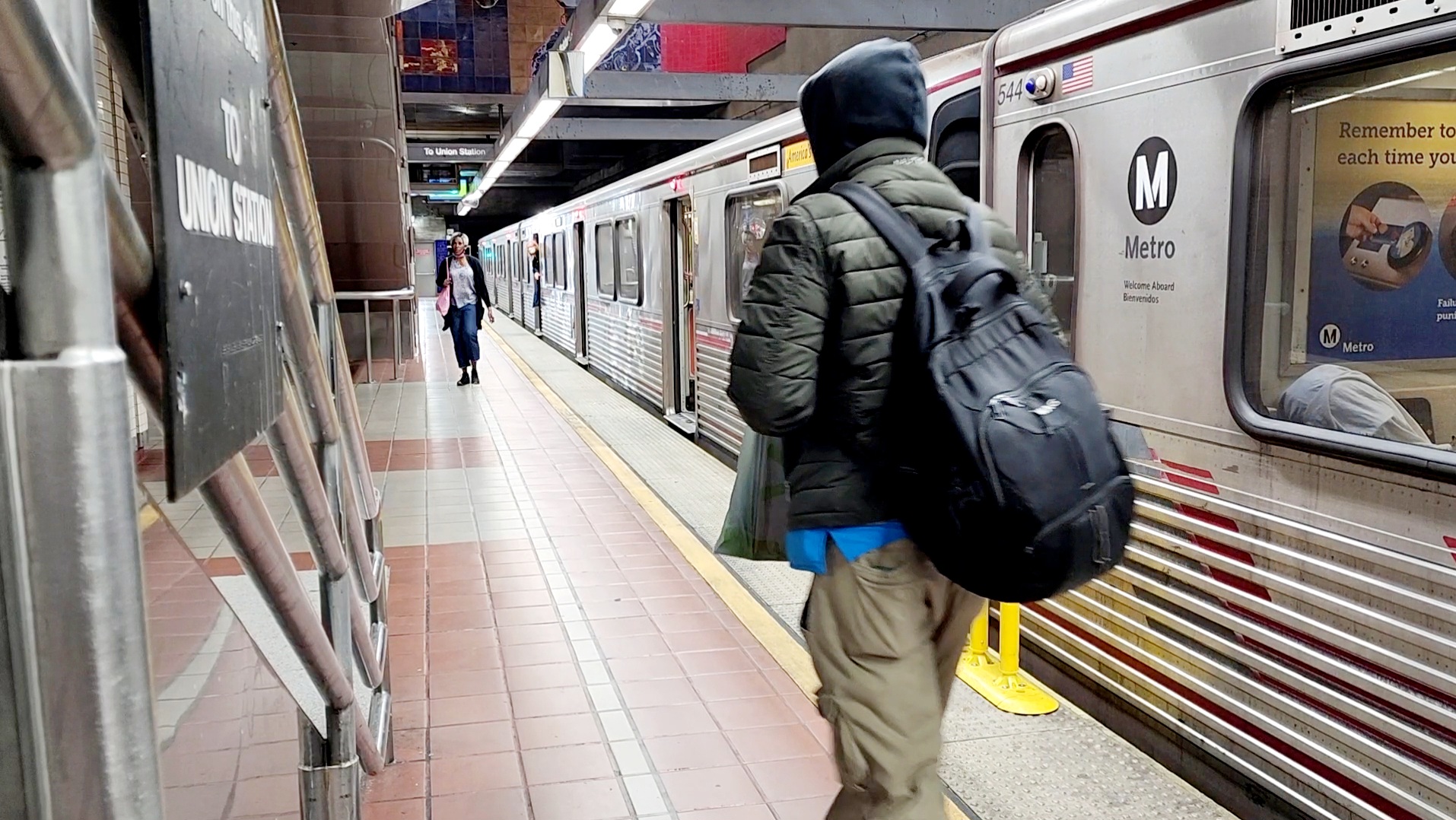On Thursday, Los Angeles Metro turned the volume down on the classical music playing at Westlake/MacArthur Park Station.
For weeks, Adrián Berenguer's ‘Immaterial,’ a dark, four-minute classical string composition, had been blasting throughout the station at near concert-level volumes.
Metro began playing classical music at the station in late February after it was deemed a “hot spot for homelessness following the deaths of more than 20 people (mostly of overdoses) on city buses and trains in the first two months of this year. Surveys also show that many commuters feel less safe riding Metro.
The music is part of a larger strategy to reduce crime and overdoses at the station, including closing off one of the entrances, hiring transit ambassadors, installing brighter lighting and cameras, and partnering with health providers. Officials say they're already seeing a reduction in "graffiti, vandalism, loitering, and trash/clean-up incidents" due to these efforts.
On Thursday morning, a playlist of mostly piano compositions played at a much lower volume than earlier in the week, while transit ambassadors walked the platform. The sound of incoming trains was louder than the music. And it was so faint in parts of the station that you could barely hear it.
A spokesperson for Los Angeles Metro told L.A. TACO that the new compositions being used at the station “includes Bach and Beethoven.”
This change in music comes after Metro was heavily criticized for playing music at Westlake/MacArthur Park Station at high volumes and the composer responsible for the tune spoke out on social media.
One Metro rider said the music gave the station a “Clockwork Orange feel.” Another described the music to Alissa Walker, senior reporter for New York Magazine, as “earplugs-at-a-concert loud.”
Earlier this week the the Times reported that Berenguer’s ‘Immaterial’ peaked at a whopping 90 decibels. Or slightly louder than your average gas-powered leaf blower. Exposure to sound in this decibel range for more than two hours can cause damage to hearing, according to the Center For Disease Control (CDC).
A spokesperson for Metro told the Times that the decibel level was closer to 70, or slightly quieter than a noisy street. On Thursday, L.A. TACO recorded an average decibel level of around 65, depending where you stood in the station.
I had to see the Westlake/MacArthur Park station myself. Playing the high energy classical music really gives it the Clockwork Orange feel. The station was being cleaned and I saw the ambassadors. pic.twitter.com/Rvm7598QZQ
— henryfung@onewilshire.la (@calwatch) March 23, 2023
Following the Times reporting, Berengue broke his silence. “I have not given any permission for my music to be used for these purposes,” the Barcelona-born composer said in a tweet on Tuesday. “I believe that no form of art should be used to discourage or limit freedoms.”
Two days later, Berenguer announced that Metro had responded. “I wanted to tell you that the LA Subway has kindly agreed to my request and they are going to stop using my music.”
Forcing someone to listen to music at high volumes for long periods of time has a long history of being used a form of torture, according to experts and civil rights groups. Studies show that the “sensory-overload” sensation that loud music induces can be disorienting and cause people to “break.”
A 2008 report by the Associated Press detailed how the Central Intelligence Agency (CIA) forced detainees at Guantanamo Bay to listen to Eminem’s ‘White America’ and the theme song to the television series Barney on repeat "to create fear, disorient…and prolong capture shock."
Earlier this week, two former Oklahoma jail officers were suspended for two years for forcing detainees to listen to the viral hit ‘Baby Shark’ while standing in a “stress position.”
At lower volumes, classical music can have the opposite effect, however. Playing Mozart at a high-end store can make customers feel as if they’re participating in an elite experience and encourage them to spend more money, according to musicologist Lily E. Hirsch.
Metro says that “music is just one part of the story.” In addition to playing classical music, Metro has installed brighter lights on platforms at Westlake/MacArthur Park Station, closed off one of the two exits, and is in the process of setting up an “observational post” outside of the station outfitted with several cameras. They’ve also added Metro Ambassadors, Metro Transit Security, and dedicated Metro Custodians to the station.
“Early in 2023, we saw increases in illegal activity and fatal drug overdoses at the Westlake/MacArthur Park station, which has, unfortunately, long been a place with a disproportionately high amount of crime, drug use and loitering,” said Metro spokesperson, Patrick Chandler.
“We quickly marshaled resources to address these issues and began testing an approach to improve safety and the customer experience at Westlake/MacArthur Park Station that is intended to prevent issues before they occur.”
Those efforts have already resulted in a more than 50 percent reduction in “graffiti, vandalism, loitering and trash/clean-up incidents,” according to Chandler.
The statement noted that Metro’s also been meeting with “neighborhood stakeholders and our city and county partners to reimagine the vendor marketplace" as well as health care professionals to offer free medical services.
“This entire effort is aimed at turning the Westlake MacArthur Park Station into a space Metro riders can use for its intended purpose: accessing the public’s transit system.”







